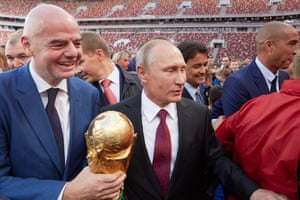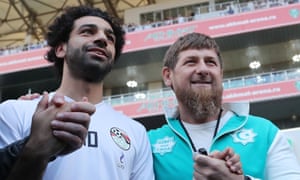

Ugly Gays: A Playground of Bodily Categorisation
I’m in Russia – but I’m not here for the football. Fifa has allowed the sport to legitimise Putin’s abnormal regime – and I’m here to protest
Fifa President Gianni Infantino and Putin in Moscow during the 2017 World Cup trophy tour. Photograph: Oleg Nikishin - FIFA/FIFA via Getty Images
I’m in Moscow trying to lie low and evade the Russian security service, the FSB. I’m exhausted from the stress. It’s my sixth time in the country; each time, I’ve visited in order to support LGBT+ campaigners who were attempting to hold a Pride parade and festival. On every occasion these were suppressed by the authorities, sometimes violently. I’ve been arrested twice and once been beaten almost unconscious.
This time I’m here for the World Cup – but unlike thousands of fans, I won’t be cheering on this festival of football. LGBT+ people and many other Russians suffer state-sanctioned persecution and far-right violence. These abuses need to be challenged. Russia’s 2013 anti-gay law against “homosexual propaganda” has been used to suppress peaceful LGBT+ protests, sack LGBT+ teachers and suppress welfare organisations that support LGBT+ teenagers.
On the eve of the World Cup, far-right and ultra-nationalist gangs have threatened to bash and stab LGBT+ football fans. The authorities have taken no discernible action against the perpetrators of these criminal threats.
I know from personal experience the hands-off approach adopted by the Kremlin. I was badly beaten by neo-Nazis opposite City Hall in Moscow in 2007 while the police stood by and watched. As I came close to losing consciousness, I was arrested, while my main attacker was allowed to walk free.
The Russian state is not the only World Cup culprit. Football’s governing body, Fifa, must also be challenged over its decision to award the 2018 World Cup to a nation where human rights are violated. Fifa has chosen to follow this travesty with the 2022 World Cup in Qatar, where dissidents’ and migrant workers’ human rights are abused. Fifa pays lip service to diversity and equality while rewarding tyrant regimes with the prestige of hosting one of the world’s most celebrated sporting events.
I have come to Russia this week because President Vladimir Putin should not be allowed to score a PR coup with the World Cup. Most LGBT+ people inRussia are understandably too afraid to openly protest against their persecution. They fear arrest and being attacked by extremists. I am afraid too, but to win freedom sometimes we have to be prepared to take risks.
I’m supporting Russian LGBT+ advocates and other human rights defenders. They want President Putin to uphold Russia’s constitution and its international human rights obligations, such as the European convention on human rights, which Russia signed and pledged to uphold. I am fearful of arrest and violent attack, but undeterred. Inspired by the campaigning and heroism of Russian LGBT+ activists, I’m acting in solidarity with their battle for equal human rights.
Russia should not be allowed to bask in World Cup glory while abusing LGBT+ people.
• Peter Tatchell is a human rights campaigner
Since you're here…
… we have a small favour to ask. More people are reading and supporting our independent, investigative reporting than ever before. And unlike many news organisations, we have chosen an approach that allows us to keep our journalism accessible to all, regardless of where they live or what they can afford.
This is The Guardian’s model for open, independent journalism: available to everyone, funded by our readers. Readers’ support powers our work, giving our reporting impact and safeguarding our essential editorial independence. This means the responsibility of protecting independent journalism is shared, enabling us all to feel empowered to bring about real change in the world. Your support gives Guardian journalists the time, space and freedom to report with tenacity and rigor, to shed light where others won’t. It emboldens us to challenge authority and question the status quo. And by keeping all of our journalism free and open to all, we can foster inclusivity, diversity, make space for debate, inspire conversation – so more people, across the world, have access to accurate information with integrity at its heart.
The Guardian is editorially independent, meaning we set our own agenda. Our journalism is free from commercial bias and not influenced by billionaire owners, politicians or shareholders. No one edits our editor. No one steers our opinion. This is important as it enables us to give a voice to those less heard, challenge the powerful and hold them to account. It’s what makes us different to so many others in the media, at a time when factual, honest reporting is critical.
Every contribution we receive from readers like you, big or small, goes directly into funding our journalism. This support enables us to keep working as we do – but we must maintain and build on it for every year to come. Support The Guardian from as little as £1 – and it only takes a minute. Thank you.





Nessun commento:
Posta un commento